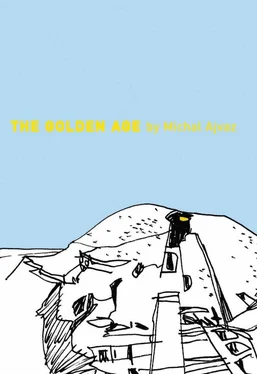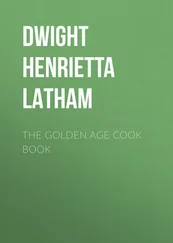Michal Ajvaz - The Golden Age
Здесь есть возможность читать онлайн «Michal Ajvaz - The Golden Age» весь текст электронной книги совершенно бесплатно (целиком полную версию без сокращений). В некоторых случаях можно слушать аудио, скачать через торрент в формате fb2 и присутствует краткое содержание. Год выпуска: 2010, Издательство: Dalkey Archive Press, Жанр: Современная проза, на английском языке. Описание произведения, (предисловие) а так же отзывы посетителей доступны на портале библиотеки ЛибКат.
- Название:The Golden Age
- Автор:
- Издательство:Dalkey Archive Press
- Жанр:
- Год:2010
- ISBN:нет данных
- Рейтинг книги:4 / 5. Голосов: 1
-
Избранное:Добавить в избранное
- Отзывы:
-
Ваша оценка:
- 80
- 1
- 2
- 3
- 4
- 5
The Golden Age: краткое содержание, описание и аннотация
Предлагаем к чтению аннотацию, описание, краткое содержание или предисловие (зависит от того, что написал сам автор книги «The Golden Age»). Если вы не нашли необходимую информацию о книге — напишите в комментариях, мы постараемся отыскать её.
is Michal Ajvaz’s greatest and most ambitious work.
The Golden Age
The Golden Age — читать онлайн бесплатно полную книгу (весь текст) целиком
Ниже представлен текст книги, разбитый по страницам. Система сохранения места последней прочитанной страницы, позволяет с удобством читать онлайн бесплатно книгу «The Golden Age», без необходимости каждый раз заново искать на чём Вы остановились. Поставьте закладку, и сможете в любой момент перейти на страницу, на которой закончили чтение.
Интервал:
Закладка:
Fabulation is an adventure of encounter and homecoming; it carries you to landscapes where there is a murmur of stories hitherto unknown, where faceless figures take shape, where the bodies of inarticulate beings — great larvae — rub against yours in the dark. You realize that this landscape is not only the birthplace of the story; it is a home for your own gestures, actions and thoughts. Only in stories born of this landscape do you encounter your true self. Remember how Fo saw himself in the faces of his characters and the mysterious letters that recorded his true name. You will realize that your life is in some strange way a copy of the stories that arise from this landscape. And you will smile when I tell you of the literature of the authentic diary because you will know that you never encounter yourself until you leave yourself behind for the world of magical stories. Even the most candid diary is an embarrassing conceit, as the I of such literature is always a pitiable, fantastical figure who is less real than all the kings, princes and princesses of the island’s Book .
Performance
The sculptor is happy to accept Hios’s assignment. Never before has he made a large statue out of gold, and he is excited by the prospect of creating a work whose greatest part will be a depiction of another statue and which will portray living beings (the upper half of Gato’s body emerging from the jelly and the predatory fish biting into his flesh) in one place only. So the time comes when, in place of the work in jelly, there stands in the courtyard a statue of gold, showing Gato with his face twisted in pain, his body behung with predatory fish, as he emerges from Mii’s statue of jelly, which is leaning slightly to one side in the evening wind. Day after day in the early morning Hios sits herself in front of the golden statue; the burning, dazzling sunlight is reflected from its curves into the princess’s eyes, turning them into fireballs that whizz about like meteors in the dark inner universe behind Hios’s aching lids.
One night Hios has a dream in which she is again witness to the final moments of Gato’s life. But this time the prince’s death is played out in a world where everything is made of gold. A golden figure with the face of Gato steps into a golden statue on a golden courtyard, struggles through the statue to the golden head of a giant squid, and when he re-emerges from the golden jelly he is behung with golden fish. When Gato at last falls, a golden surface closes over him. When the Hios of the dream looks about herself, she sees that the terror-stricken courtiers, too, are made of gold, and she thinks that her eyes will not withstand so great a glare. She lifts her arms to cover her eyes and hears a clang as her golden palms strike against her golden face, and this wakes her.
The next day at luncheon she retells her dream, lamenting that the statue of gold can never be made to move. Sitting at the table next to the commander of the praetorian guard is Nubra, and this talk of an impossible statue immediately rouses his attention. As we know, Nubra loves a challenge. He turns to Hios and informs her he will make a moving statue that will depict her golden dream. As he is saying this, he has no idea how he will accomplish the task. The next week he never leaves his chamber; he lies on the bed, contemplating how he will keep the promise to Hios and complete the assignment he has set for himself. His gaze roams about the flower-pattern motifs that are endlessly repeated on the paper covering the walls of his chamber. He has a great many ideas, but all of these he gradually rejects. At one moment his eyes light on the stylized drawing of the bud of a lotus next to a lotus whose petals are already open; Nubra has the feeling he is seeing the flower open. And then the solution to his assignment comes to him. In order that the viewer see how the golden Gato dies and how the golden fish thrash about, it is not necessary in the least that the statue itself move. All that there remains for him to do is to construct a mechanism whose real but invisible movements will give the (false) impression that the statue is moving.
He presents his plan to Hios, and she promises to get for him everything he needs. Having worried that the princess would find his vision too grand and too costly, Hios is taken aback to see that she considers it too modest a memorial to Gato and her pain and hatred. Nubra cannot know that on first acquaintance with his idea, she sees in it the germ of a work far more wide-ranging — a golden statue that will be a second-by-second representation of the whole of Gato’s stay at the palace, beginning with Gato showing the chamberlain the carpet with the fairy-tale castle, followed by his work on the carpet commissioned by Taal, his night-time lovemaking with Hios, the moment when he stands anxiously before the labyrinth on the door of the treasury. But for now Hios charges the sculptor only with building in the palace gardens an amphitheatre which will be part of the moving statue.
The monstrous work, in which Hios’s incipient madness is joined and complemented by Nubra’s cold, technical reason, is ready within the year. Nubra produces several dozen statues to represent individual phases of Gato’s course through the statuary, from the moment he first stands before it to the moment he falls back into the jelly. This series also includes original statues in gold. The rest of the statues are gold-plated only, as Devel does not possess enough gold. Nubra has the statues built on a great turntable he has placed in the palace gardens, in front of which he orders a wall built with an opening where it meets the turntable, out of which rises the auditorium of the amphitheatre.
It is possible to close and re-open this hole in the wall by means of the two lightning-fast wings of a sliding door, which come together with a heavy impact (the sound of their colliding is softened by upholstered strips stuck to inside edge of each wing), then slide swiftly into cavities in the wall. All motions of the mechanism are unified by an ingenious transmission system. In the fraction of a second for which the door is closed, the turntable moves to bring round a statue representing the next phase of the action. When the doors re-open — again, this takes but a fraction of a second — the new statue is before the audience, and this is followed by a statue representing the next phase of the action, and so on. These rapid-changing statues create a grisly golden film about the death of Prince Gato.
When Nubra is building the amphitheatre, Hios has the palace park closed so that preparations for the Golden Statue Theatre can be carried on in secret. She forbids the workmen engaged on it from speaking about the work on pain of death. It is unnecessary for her to impose any prohibitions on Nubra: the surprise his inventions will excite is an inseparable part of the work, and besides, absolute silence is a central feature of his manner of working. The courtiers look with anxiety towards the closed gates of the park, at the constant comings and goings of covered wagons; they listen day and night to the workmen’s blows and think nothing good can come of it. Then the noise in the park ceases and the wagons disappear. Shortly after this, all the ladies and gentlemen of the court receive an invitation to a performance in the palace park. Uddo, too, receives an invitation — one look at the guards who deliver the invitation is enough to dissuade her from refusing it. The performance is due to commence after nightfall. With foreboding, the courtiers take their seats in the auditorium. It is barely two years since they were made to participate in another wicked performance at another place in the palace grounds. They have no idea what it is that is about to be presented to them, nor whether they will have to sit through more deathly ballets and bloody operas in the future. Uddo tries to hide in the back row, but when a guard comes to her a short while later and orders her to move to the front next to Hios, she allows herself to be led to an empty seat before the grey door in the wall.
Читать дальшеИнтервал:
Закладка:
Похожие книги на «The Golden Age»
Представляем Вашему вниманию похожие книги на «The Golden Age» списком для выбора. Мы отобрали схожую по названию и смыслу литературу в надежде предоставить читателям больше вариантов отыскать новые, интересные, ещё непрочитанные произведения.
Обсуждение, отзывы о книге «The Golden Age» и просто собственные мнения читателей. Оставьте ваши комментарии, напишите, что Вы думаете о произведении, его смысле или главных героях. Укажите что конкретно понравилось, а что нет, и почему Вы так считаете.












